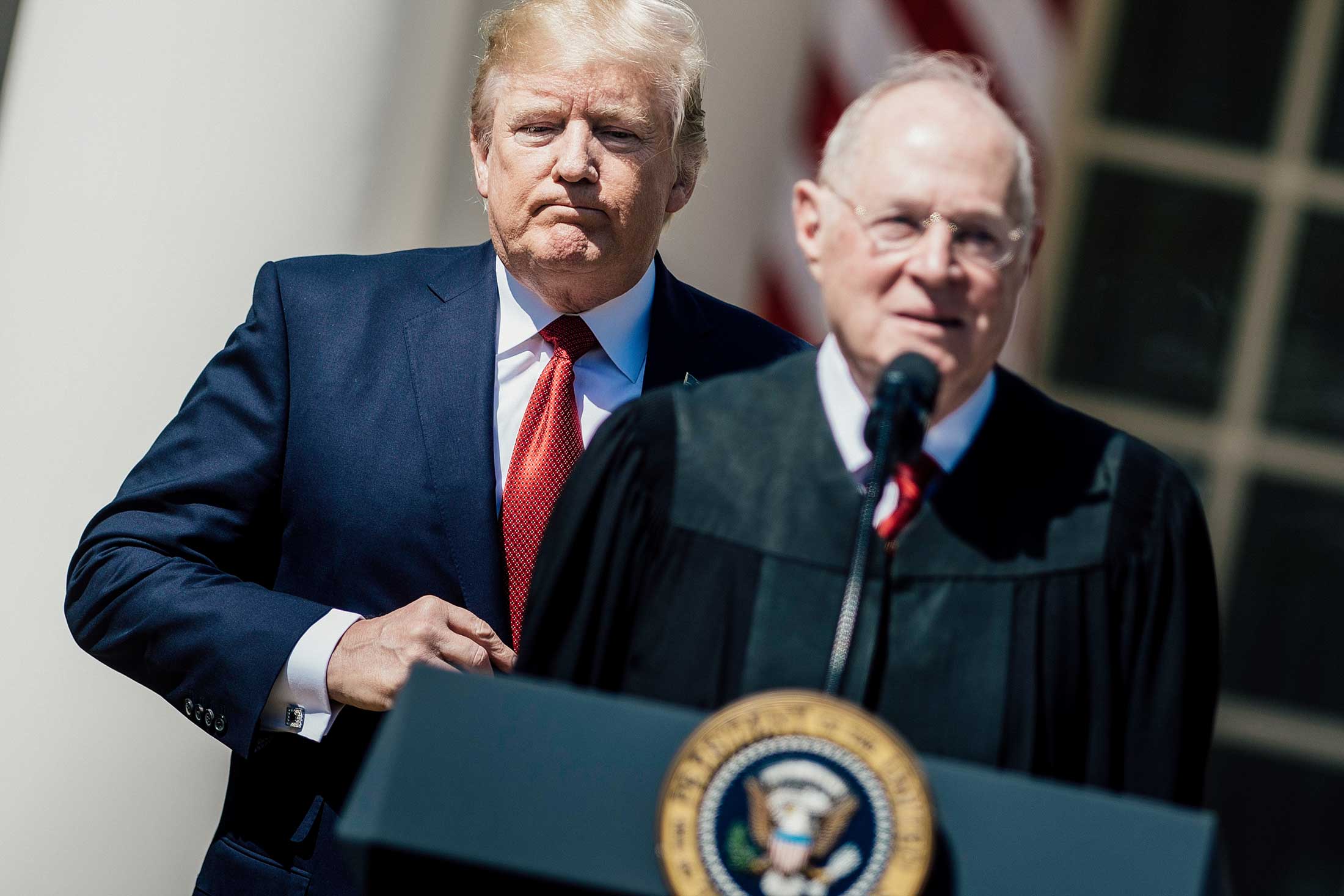Justice Anthony Kennedy’s retirement from the Supreme Court shocked liberals so deeply that some haven’t quite accepted that his decision to step down was on the up and up. A New York Times report on the Trump administration’s quest to nudge Kennedy off the bench has spawned a series of conspiracy theories that revolve around one detail in the piece: The justice’s son, Justin Kennedy, worked at Deutsche Bank when it loaned Trump more than $1 billion. Deutsche Bank loaned money to Trump when no other banks would, and it plays a still-mysterious role in Robert Mueller’s Russia investigation.
What if anything is going on here? ThinkProgress calls the connection between Trump and the Kennedy family a “suspicious business relationship,” while the New Republic labels it “shady.” Richard Painter, George W. Bush’s former chief ethics council—who is now a candidate in Minnesota’s Democratic Senate primary—tweeted that the “circumstances of Anthony Kennedy’s resignation must be investigated by the Senate Judiciary Committee before any replacement is considered,” adding, “The Constitution does not give Trump the power to use underhanded means to induce Supreme Court resignations.”
How might Trump have “induced” the justice’s retirement? The logic here is fuzzy because there’s no clear quid pro quo: Kennedy’s son loaned Trump money, and in return, Trump … did nothing in particular for Kennedy but got the justice to give up his Supreme Court seat? While that doesn’t make much sense, Neera Tanden, president of the Center for American Progress, hinted at this theory of the case in a viral tweet. Snopes spells out two other hypotheses: First, that Trump “somehow leveraged his financial connections with Kennedy’s son Justin to convince or coerce the jurist to retire”; second, that Trump ousted the justice so he could “nominate a friendly successor who would vote favorably on any issues involving Justin Kennedy that might come before the court” if the younger Kennedy’s name were to come up in the Mueller probe. The implication of both theories is that the administration somehow extorted Kennedy to quit the court. This is hogwash.
As the New Yorker’s Adam Davidson has noted, there is reason for reporters to look into Justin Kennedy’s relationship with Trump, particularly in light of Deutsche Bank’s Russian money laundering scandal. Kennedy, though, left the bank in 2009, well before it enabled the Russian money laundering scheme—and for that matter, before Trump had a serious political career. The ostensible Russia connection, then, amounts to nothing. That leaves the broader theory that Deutsche Bank’s loans to Trump were somehow illicit. Yet this, too, doesn’t add up. How would the White House leverage that information against Anthony Kennedy? Trump would have to threaten to reveal it to the public—but that would incriminate him, too. Assume, for the sake of argument, that Justin Kennedy did commit a white-collar crime in his dealings with Trump. (To be clear, there is absolutely no evidence this is the case.) How could the president use this knowledge against Anthony Kennedy without placing himself in Mueller’s crosshair as well?
Therein lies the chief problem with every Mueller–Kennedy conspiracy. It is true that, if Justin Kennedy were involved in a Mueller-related crime, and the case reached the Supreme Court, Anthony Kennedy would have to recuse. And perhaps his recusal could tilt the outcome away from the administration. But the baseline question remains: How could Trump “induce” Kennedy’s retirement to prevent all this?
Each flavor of this conspiracy rests on a series of assumptions that, when subjected to any real scrutiny, quickly fall apart. Nonetheless, it’s easy to see why these theories are so seductive. Progressives who are surprised by Kennedy’s retirement bought into the myth that the justice, who occasionally swung left on key controversies like abortion and gay rights, was a moderate who dabbled in liberalism. In reality, he never really was a centrist. He voted with the right flank on most issues; his big defections were deviations from the norm. On marriage equality, he was personally sympathetic; on abortion, he genuinely thought he could unite the warring factions. His major abortion decision declared that “the contending sides of a national controversy” must “end their national division by accepting a common mandate rooted in the Constitution.” This wishful thinking never came to fruition, and so he now leaves it to his successor to do what he never quite could: Kill off Roe for good.
The justice is much more concerned about perceived threats to free expression than social issues, and he seemed to think these threats emanate primarily from Democrats. In the last days of his final term, Kennedy helped to crush public-sector unions on dubious free speech grounds and voted to strike down California’s disclosure requirements for anti-abortion “crisis pregnancy centers,” comparing the state to “relentless authoritarian regimes.” These decisions, along with legacy rulings like Citizens United, are what Kennedy is most concerned about preserving. He trusts the democratic process to prevent backsliding on gay rights but frets that free speech, once surrendered, is never recovered.
Put simply, Kennedy retired under Trump because he’s happy to leave his legacy in Trump’s hands. It didn’t require blackmail to ease him off the court, just an unctuous campaign to butter him up. If the Times is correct, then Kennedy really was heartened by the appointment of arch-conservative Neil Gorsuch. We liberals who thought the junior justice’s arrogance might alienate Kennedy were, it turned out, caught in our own daydream.
The conspiracy theories surrounding his retirement fail not just because they are baseless and illogical, but because they rest on a fundamentally dubious premise. Kennedy wasn’t extorted off the bench or recompensed for his vacancy. He left because he wanted to let Donald Trump control the fate of the Supreme Court. Mission accomplished.
